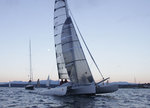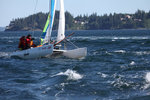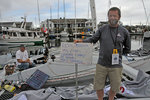UPDATED 2:30 p.m. Friday, June 12
The inaugural Race to Alaska on a boat with no motor has its first champion: Team Elsie Piddock.
The trimaran and crew of three checked in at Ketchikan, Alaska …
This item is available in full to subscribers.
We have recently launched a new and improved website. To continue reading, you will need to either log into your subscriber account, or purchase a new subscription.
If you had an active account on our previous website, then you have an account here. Simply reset your password to regain access to your account.
If you did not have an account on our previous website, but are a current print subscriber, click here to set up your website account.
Otherwise, click here to view your options for subscribing.
* Having trouble? Call our circulation department at 360-385-2900, or email our support.
Please log in to continue |
|



UPDATED 2:30 p.m. Friday, June 12
The inaugural Race to Alaska on a boat with no motor has its first champion: Team Elsie Piddock.
The trimaran and crew of three checked in at Ketchikan, Alaska at 12:55 p.m. Friday, June 12, with an elapsed time on the water, from the June 4 start in Port Townsend, of five days, four hours and six minutes to cover about 750 miles.
Team Elsie Piddock F-25C trimaran clocked 4 hours and 11 minutes from Port Townsend to Victoria, British Columbia, Canada on June 4; and starting June 7, four days, 23 hours, and 55 minutes from Victoria to Ketchikan. The team led every day out of Victoria.
Jake Beattie, Northwest Maritime Center executive director, posted about Elsie Piddock's performance.
"Team Elsie Piddock has amazed people all over the world, started countless conversations that either started or ended with 'Can you (choose your expletive) believe them? They are crushing/killing/owning/doing it!'- these words seem to precede a wide eyed expression, a shaking of the head in disbelief, and then returning to look at the tracker," Beattie wrote on r2ak.com.
With the trimaran being first to finish for the $10,000 prize, the next question is second place, and the set of steak knives.
Indeed, every finish is an accomplishment.
"First monohull, first catamaran, first beach cat, first canoe, first solo, best adventure, and the coveted Dirtbag Award to honor the finisher with the least expensive boat – standards will be set across the board and all of them worthy. Every adventure exceptional," Beattie posted.
"Team Elsie Piddock will set a high bar that will discourage the intrepid who entered the race with a theory didn’t pan out, and excite the achievers who are sitting at the computer in their underwear clicking refresh and extrapolating wind-to-course data in the belief they have the skill to best it. Conditions are never the same, humans are fickle and a future passage of this route might play incredibly differently. This is both the end of the unknown and the beginning of the next. Uncertainty is dead, long live uncertainty!"
THURSDAY June 11
Team Elsie Piddock, one of only two Race to Alaska teams that had cleared Vancouver Island as of Thursday morning, June 11, is closing in on the finish line in Ketchikan, Alaska.
A lot of boats have been bashed by big winds – in Johnstone Strait and other places – and faced a variety of equipment failure. Some boats have required emergency repairs and/or a tow.
Using a wind that Thursday morning had a northwest heading of 9.5 knots, Team Elsie Piddock, aboard a F-25C trimaran, is the clear favorite for the $10,000 R2AK first prize. Al Hughes and crew came into the race with ample open water and racing experience in the Pacific and Atlantic oceans. The team was the third boat to reach Victoria from Port Townsend in the race's opening leg June 4.
Since the June 7 start out of Victoria, bound around Vancouver Island on a 710-mile trek to Ketchikan, Alaska, Team Elsie Piddock was the first to pass the race checkpoint at Seymour Narrows, and as of June 11, the only boat to have passed the second and last checkpoint at Bella Bella.
Second place as of June 11 is Team Por Favor (John Denny and crew on a Hobie 33), yet to reach Bella Bella. Third place on June 11 is MOB Mentality (Wayne Gorrie and crew aboard a 28-foot F85SR).
Northwest Maritime Center's Race Central has provided dispatches, include one from Graeme aboard Elsie Piddock.
"Seriously tested in Johnstone Strait and the northern part of the Strait of Georgia. 'It was nuking in Johnstone Strait and the Strait of Georgia and we were amazed by the number of boats that were coming out to cheer us on, despite the conditions. A First Nations fellow came out in a rowboat to deliver sockeye salmon (that they are having for dinner) and cans labeled candy (likely the highly prized sweet smoked salmon).' They were visited by a SAR boat, but it only came out to ensure safety and take pictures ... The conditions were so bad the crew of the Piddock were worried and the boat was built for that. Once they 'crossed the line' they threw themselves a halfway party with costumes and candy. Dry suits off for the first time right now. (17:00-ish PST)."
NWMC personnel monitoring the racers said that "while the feats of the boats at the front of the race are impressive, and their motivations clear, the seamanship and tenacity of the teams on smaller vessels are no less monumental. More affected by seas, sleeping wet, eating cold, nowhere near an opportunity of more classic recognition – the first four have been hard fought days and the sheer will to continue despite all of the discomfort and disappointment is heroic beyond measure. Our hats are off to all of you. Your spirit is what this race is all about."